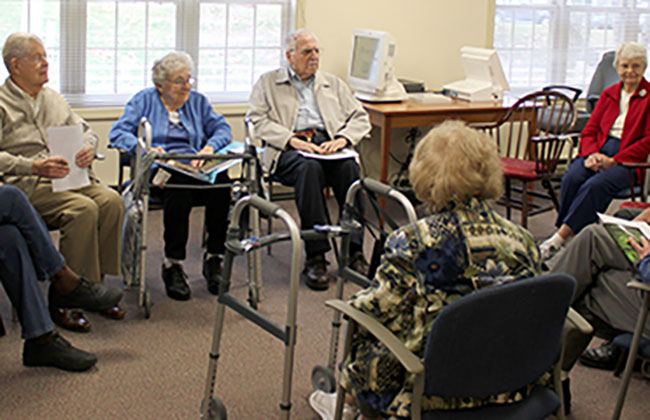Journeying through the last third of life can be viewed as a spiritual pilgrimage toward God.
[Seniors in a retirement community reflect on spiritual questions of life and death, grief, and hope. Photo by Jeanne Bianchine.]
By Cheryl Gowie
In November 2015, the Pew Research Center reported that the United States public is becoming less religious. The study found that the silent generation and baby boomers were “more religious” than younger generations.
But instead of becoming “less religious,” could it be that religion becomes more important as one ages?
Journeying through the last third of life can be viewed as a spiritual pilgrimage toward God. We spend less time in activity—especially activity requiring physical strength and endurance—and more time in contemplation. Successfully negotiating these transitions comes with accompanying material, physical, and spiritual challenges. This is why honest conversation in a caring community can be beneficial.
First Church in Albany (RCA), under the leadership of pastor Sue Vincent-Cox, regularly reaches out to seniors in local residential retirement communities, as well as in the congregation, to discuss the gifts and challenges of this pilgrimage. This takes place in a trusting, supportive small group called Pilgrim’s Walk. Discussions of one’s relationship with God center on grief and loss, forgiveness, gratitude, hope, meaning, legacy, and death and dying. The question, “Where do you find God in this?” guides the conversations.
Participants are not necessarily accustomed to sharing feelings and experiences publicly. This summer one member confided, “I’ve never done this before—talking about feelings. And I don’t know what I think about it!”
It’s often the case that deeply meaningful, poignant discussions are triggered by common readings and participants’ experiences. One member asked how to practice compassionate communication when one’s spouse suffers from Alzheimer’s and is prone to confrontation. At age 94, a retired pastor found that his prayer life has changed: his daily prayer list grows as he comes to know more and more residents in failing health. And leaving a legacy is also important: One 90-year-old woman volunteered to teach Yiddish at a summer camp and was a conversation partner to young people learning the language.
The Albany area enjoys a rich and open Jewish-Christian dialogue, which is reflected in the discussions as well. Following the shooting at Emanuel African Methodist Episcopal Church in South Carolina in June 2015, Pilgrim’s Walk participants struggled with the tension between forgiveness and righteous indignation. One Jewish member turned to our retired pastor and asked, “What is grace in this context?” The pastor’s response integrated both Jewish and Christian understandings. In another group, a participant asked a Buddhist member for an overview of the pillars of her tradition. Diversity enriches the questions, discussions, and understanding of each other.
Sandy Scudder and I, who are both members at First Church, find it fulfilling to join pastor Vincent-Cox in facilitating these discussions. We offer three different groups: Pilgrim’s Walk I (six weekly sessions), monthly support groups (six sessions), and Pilgrim’s Walk II (six sessions). All sessions open with meditation and conclude with prayer. Interfaith texts are also incorporated.
As more congregations learn about Pilgrim’s Walk, we hope to train more leaders. Members of the “silent generation” and baby boomers—the “more religious” among us, according to the Pew Research Center—have much to share about life and faith. They are the keepers of the faith, serving as mentors and models for younger generations.
Cheryl Gowie is a member at First Church in Albany (RCA). For information about Pilgrim’s Walk and becoming a facilitator, visit www.firstchurchinalbany.org.





